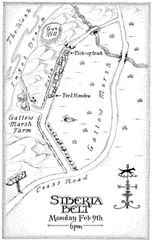Jim Wannamaker - Death's Wisher
Здесь есть возможность читать онлайн «Jim Wannamaker - Death's Wisher» — ознакомительный отрывок электронной книги совершенно бесплатно, а после прочтения отрывка купить полную версию. В некоторых случаях можно слушать аудио, скачать через торрент в формате fb2 и присутствует краткое содержание. Издательство: Иностранный паблик, Жанр: foreign_sf, foreign_antique, foreign_prose, на английском языке. Описание произведения, (предисловие) а так же отзывы посетителей доступны на портале библиотеки ЛибКат.
- Название:Death's Wisher
- Автор:
- Издательство:Иностранный паблик
- Жанр:
- Год:неизвестен
- ISBN:нет данных
- Рейтинг книги:5 / 5. Голосов: 1
-
Избранное:Добавить в избранное
- Отзывы:
-
Ваша оценка:
- 100
- 1
- 2
- 3
- 4
- 5
Death's Wisher: краткое содержание, описание и аннотация
Предлагаем к чтению аннотацию, описание, краткое содержание или предисловие (зависит от того, что написал сам автор книги «Death's Wisher»). Если вы не нашли необходимую информацию о книге — напишите в комментариях, мы постараемся отыскать её.
Death's Wisher — читать онлайн ознакомительный отрывок
Ниже представлен текст книги, разбитый по страницам. Система сохранения места последней прочитанной страницы, позволяет с удобством читать онлайн бесплатно книгу «Death's Wisher», без необходимости каждый раз заново искать на чём Вы остановились. Поставьте закладку, и сможете в любой момент перейти на страницу, на которой закончили чтение.
Интервал:
Закладка:
Jim Wannamaker
Death's Wisher
DEATH'S WISHER
There's just one way to disarm a bomb—be at least a step ahead of it—but what if it's always at least a step ahead of you?
Flinn took the seat that Wilmer indicated, dropped his overnight bag beside it, and tried to relax. He'd had five hours of inactivity on the plane, but the peremptory manner with which he had been routed out of his California apartment and conveyed to Washington, D. C, had so filled his mind with unanswered questions that he still found rest to be impossible. He had been told simply that the government needed him; and when federal wheels started turning, there wasn't much a private citizen could do to stop them.
He watched the tall, lean, dark-haired man, who had been introduced as Dr. Jackson Wilmer, nuclear physicist, disappear through a door.
Flinn looked around.
The room in which he sat—comparatively small, one of hundreds in the vastness of the Pentagon—seemed to be a sort of minor office. At least there were several desks and filing cabinets. Besides himself, there were now only two other men in the room.
One, a complete stranger, sat at a desk across the room with his back turned toward Flinn.
The other leaned against the wall near the door. All Flinn knew about him, despite the fact that they had been as close as boy and dog for the past seven hours, was that his name was Hayes and that he was a special agent of the Federal Bureau of Investigation. There was a muscular hardness about this young man that betrayed an athletic background. He was about thirty, had a craggy face beneath short brown hair, hard gray eyes, and his nose had been broken at least once. There was a light trace of beard beginning to show on the agent's face, but his brown summer suit still looked neat, and the man himself seemed something less than tired.
Looking at him, Flinn felt a sense of his own shabbiness. He needed a shave as badly as his slacks and sports jacket needed pressing.
At forty-two, Flinn was somewhat taller than average and slightly underweight from overwork and the irregularities of a bachelor existence. His black hair, beginning to recede a little, was peppered with silver, and his normally relaxed face was now tight, and the whites of his hazel eyes were bloodshot.
The door beside Hayes opened and Wilmer entered, carrying a brown folder. He was in his shirtsleeves, his necktie pulled down and his collar open, and, as he approached, Flinn noted that the deeply tanned face of the physicist was as stubbled and tired-looking as his own felt. He was about the same age as Flinn.
Wilmer tossed the folder on the desk in front of Flinn and then perched on one corner of the desk. He gazed at the parapsychologist for a long few seconds, his eyes startingly ice-blue in his dark face.
"Well," he said presently, "I guess you're wondering what this is all about."
"Yes, I guess I am," Flinn said wryly. "This bird dog—" he indicated Hayes with a nod of his head, and the agent retaliated with a flash of teeth—"hauls me away from an important experiment, loads me on an Air Force jet, and, after a high-altitude flight at God only knows what kind of fantastic speeds, I find myself in the holiest of holies, surrounded by MPs and—yes, you might say I'm wondering what this is all about."
Wilmer nodded patiently and rubbed one hand across his eyes.
"When you find out, you'll understand the reason for the secrecy." He faced Hayes. "How long have we been on this thing now, Fred? It seems like weeks."
"Ten days," the FBI man answered.
Wilmer shook his head slowly, then reached for the folder, opened it, and took out several scientific journals that Flinn recognized instantly. The physicist opened one of them.
"'Advanced Experiments in TP, by Patrick Flinn,'" he read. He laid the publication aside and picked up another. "'A Monograph on the Probabilities of TH,' same author."
He quoted at random from the introductory page: "'It is therefore my belief, based upon recent preliminary experimentation, that not only can one mind be used to scan the thoughts of another, but that ideas and suggestions may be implanted upon another's mind without the knowledge of the receptor. This is not to be confused with simple telepathic 'sending,' where the receptor is completely aware of the other's transmission. This to which I refer may, at least in one phase, be described as hypnotic in effect. The possibilities of such influence over the mind-matter of another are more than somewhat considerable....'"
He paused, lowered the journal and gazed speculatively at Patrick Flinn. "Telepathy, telehypnosis," he said, rolling out the words as if they left a strange taste in his mouth. "Very interesting. Just how much truth is there in all this stuff? I mean, how far along are you, really?"
Flinn considered the question for a few seconds. It was one he had heard often, especially from his colleagues at the small California college where he held an assistantship in psychology. But after twenty years of skepticism—he had first discovered his rudimentary telepathic abilities just after graduating from college, and had been experimenting and advancing ever since—he had become immune to criticism.
"Very few people bother to read my articles," Flinn said evenly, "and still fewer understand them, and the fewest believe. But I can tell you I'm far enough along in my research to know that the human mind has latent powers that are, to quote my article, more than somewhat considerable."
Wilmer and Hayes exchanged glances.
"That's fine," Wilmer said, "but abstruse, wouldn't you say? What I'm getting at is, I want to see a practical demonstration."
"Put up or shut up, eh?" Flinn said.
"I'd rather call it an examining of credentials," the physicist countered.
"All right. I don't see any connection between my work and nuclear physics, but what do you want me to do? First, though, I'd better explain that I might fail. I'm really just on the threshold."
"Granted. So I'll make it easy. Suppose—" He looked over his shoulder, faced Flinn again, and continued in a low voice: "Suppose you tell me what the man at the far desk is thinking."
Flinn glanced past the physicist at the stranger across the room. The man seemed completely unaware of the others. He was poring over some papers that were spread out upon the desk.
Flinn focused his eyes upon the man's head. His mind was really too steeped in fatigue for this sort of thing, but it was a chance not to be missed, a chance to demonstrate his talents in the presence of a responsible scientist, so he willed himself into a gradually deepening concentration. His eyes seemed to go myopic, out of focus. A gray, ethereal haze came into his consciousness, like swirling smoke. Easy? But presently a picture began to form, blurred at first, then fragmentary, then coming into identifiable clarity.
Flinn held it for a moment, before snapping back into objective consciousness. He was grinning slightly as his eyes refocused and came to rest on Wilmer.
"Well?" the physicist asked.
"What's his name?" Flinn said.
"Barnes. Robert Barnes."
"Say, Bob!" Flinn called out. The smallish, partially bald man at the far desk looked up and swiveled around to face him. "Tell me something, Bob," Flinn went on. "Do you act that way with all women, or just blondes?"
Barnes' placid face suddenly underwent a marvelous transformation. First he blushed furiously. Then his jaw dropped open and the high color began to drain away. He stared across the room, his face pallid.
"My God!" he managed to blurt in a stricken voice.
There was dead silence in the room as Wilmer and Hayes looked from Barnes' shocked face to Flinn's smiling one.
Читать дальшеИнтервал:
Закладка:
Похожие книги на «Death's Wisher»
Представляем Вашему вниманию похожие книги на «Death's Wisher» списком для выбора. Мы отобрали схожую по названию и смыслу литературу в надежде предоставить читателям больше вариантов отыскать новые, интересные, ещё непрочитанные произведения.
Обсуждение, отзывы о книге «Death's Wisher» и просто собственные мнения читателей. Оставьте ваши комментарии, напишите, что Вы думаете о произведении, его смысле или главных героях. Укажите что конкретно понравилось, а что нет, и почему Вы так считаете.










